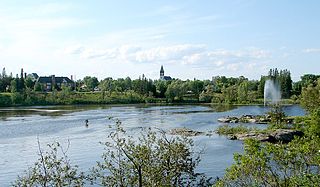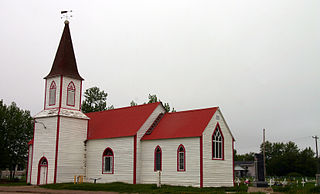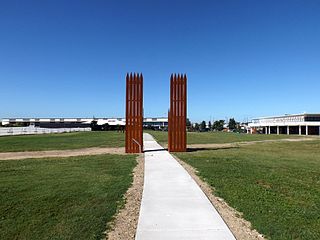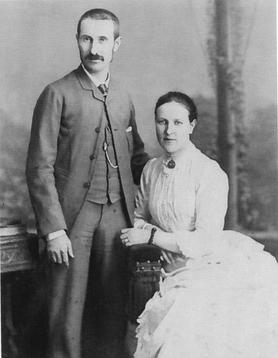Related Research Articles

The East India Company (EIC) was an English, and later British, joint-stock company founded in 1600 and dissolved in 1874. It was formed to trade in the Indian Ocean region, initially with the East Indies, and later with East Asia. The company gained control of large parts of South Asia and colonised parts of Southeast Asia and Hong Kong. At its peak, the company was the largest corporation in the world by various measures and had its own armed forces in the form of the company's three presidency armies, totalling about 260,000 soldiers, twice the size of the British army at the time.

Bathurst is a city in northern New Brunswick with a population of 12,157 and the 4th largest metropolitan area in New Brunswick as defined by Census Canada with a population of 31,387 as of 2021. The City of Bathurst overlooks Nepisiguit Bay, part of Chaleur Bay and is at the estuary of the Nepisiguit River.

Kapuskasing is a town on the Kapuskasing River in the Cochrane District of Northern Ontario, Canada, approximately 92 kilometres (57 mi) east of Hearst and 130 kilometres (81 mi) northwest of Timmins. The town was known as MacPherson until 1917, when the name was changed so as not to conflict with another railway stop in Manitoba.

Plymouth is a town and county seat of Plymouth County, Massachusetts, United States. Located in Greater Boston, the town holds a place of great prominence in American history, folklore, and culture, and is known as "America's Hometown". Plymouth was the site of the colony founded in 1620 by the Mayflower Pilgrims, where New England was first established. It is the oldest municipality in New England and one of the oldest in the United States. The town has served as the location of several prominent events, one of the more notable being the First Thanksgiving feast. Plymouth served as the capital of Plymouth Colony from its founding in 1620 until the colony's merger with the Massachusetts Bay Colony in 1691. The English explorer John Smith named the area Plymouth and the region 'New England' during his voyage of 1614. It was a later coincidence that, after an aborted attempt to make the 1620 trans-Atlantic crossing from Southampton, the Mayflower finally set sail for America from Plymouth, England.

Kanpur ( ), formerly anglicized as Cawnpore, is a large industrial city located in the central-western part of the state of Uttar Pradesh, India. Founded in year 1207, Kanpur became one of the most important commercial and military stations of British India. Kanpur is also the financial capital of Uttar Pradesh and part of upcoming Bundelkhand Industrial Development Authority i.e. BIDA Nestled on the banks of Ganges River, Kanpur has been the major financial and industrial centre of North India and also the ninth-largest urban economy in India. Today it is famous for its colonial architecture, gardens, sweets, dialect, IT parks and fine quality leather, plastic and textile products which are exported mainly to the West.

Amritsar, historically also known as Rāmdāspur and colloquially as Ambarsar, is the second-largest city in the Indian state of Punjab, after Ludhiana. It is a major cultural, transportation and economic centre, located in the Majha region of Punjab. The city is the administrative headquarters of the Amritsar district. It is situated 217 km (135 mi) north-west of Chandigarh, and 455 km (283 mi) north-west of New Delhi. It is 28 km (17.4 mi) from the India-Pakistan border, and 47 km (29 mi) north-east of Lahore, Pakistan.

Colonia Dignidad was an isolated colony established in post-World War II Chile by emigrant Germans which became notorious for the internment, torture, and murder of dissidents during the military dictatorship of General Augusto Pinochet in the 1970s while under the leadership of German emigrant preacher Paul Schäfer. Colonia Dignidad has been described as a "state within a state".

The Indian Rebellion of 1857 was a major uprising in India in 1857–58 against the rule of the British East India Company, which functioned as a sovereign power on behalf of the British Crown. The rebellion began on 10 May 1857 in the form of a mutiny of sepoys of the company's army in the garrison town of Meerut, 40 mi (64 km) northeast of Delhi. It then erupted into other mutinies and civilian rebellions chiefly in the upper Gangetic plain and central India, though incidents of revolt also occurred farther north and east. The rebellion posed a military threat to British power in that region, and was contained only with the rebels' defeat in Gwalior on 20 June 1858. On 1 November 1858, the British granted amnesty to all rebels not involved in murder, though they did not declare the hostilities to have formally ended until 8 July 1859.

Fergus is the largest community in Centre Wellington, a township within Wellington County in Ontario, Canada. It lies on the Grand River about 18 km NNW of Guelph. The population of this community at the time of the 2016 Census was 20,767, but the community is growing as new homes are being built for sale.

Nana Saheb Peshwa II, born as Dhondu Pant, was an Indian aristocrat and fighter, who led the rebellion in Cawnpore (Kanpur) during the 1857 rebellion against the East India Company. As the adopted son of the exiled Maratha Peshwa Baji Rao II, Nana Saheb believed that he was entitled to a pension from the company, but as he was denied recognition under Lord Dalhousie's doctrine of lapse, he initiated a rebellion. He forced the British garrison in Kanpur to surrender, then murdered the survivors, gaining control of the city for a few days. After a British force recaptured Kanpur, Nana Saheb disappeared, with multiple conflicting accounts existing of his further life and death.

Bareilly is a city in Bareilly district in the Indian state of Uttar Pradesh. It is among the largest metropolises in Western Uttar Pradesh and is the centre of the Bareilly division as well as the historical region of Rohilkhand. The city lies in the Indo-Gangetic Plains, about 252 kilometres (157 mi) northwest of the state capital, Lucknow, and 265 kilometres (165 mi) east of the national capital, New Delhi. With a population of 903,668 in 2011, it is the eighth most populous city in the state, 17th in northern India and 54th in India. It is located on the bank of Ramganga River and is the site of the Ramganga Barrage built for canal irrigation.

The Lumbee are a Native American people primarily centered in Robeson, Hoke, Cumberland, and Scotland counties in North Carolina.

Moose Factory is a community in the Cochrane District, Ontario, Canada. It is located on Moose Factory Island, near the mouth of the Moose River, which is at the southern end of James Bay. It was the first English-speaking settlement in lands now making up Ontario and the second Hudson's Bay Company post to be set up in North America after Fort Rupert. On the mainland, across the Moose River, is the nearby community of Moosonee, which is accessible by water taxi in the summer, ice road in the winter, and chartered helicopter in the off-season.

Kilifi is a town on the coast of Kenya, 56 kilometres (35 mi) northeast by road of Mombasa. The town lies on the Kilifi Creek and sits on the estuary of the Goshi River. Kilifi is the capital of Kilifi County and has a population of 122,899.
Dartmouth founded in 1750, is a Metropolitan Area and former city in the Canadian province of Nova Scotia.

British India Corporation Limited (BIC) is a central public sector undertaking under the ownership of the Ministry of Textiles, Government of India. The CPSU produces textiles for use by civilians and the Indian armed forces. It manufactures the popular "Lal-imli" and "Dhariwal" brands of woollen products. The CPSU was established in 1872 or 1876 by Sir Alexander MacRobert as a CPSU when he combined his six companies into one enterprise. MacRobert died on 22 June 1922 and his widow, Rachel, Lady MacRobert, assumed the role of director until her eldest son, Alasdair, became chairman in 1937.

The Colony and Protectorate of Kenya, commonly known as British Kenya or British East Africa, was part of the British Empire in Africa from 1920 until 1963. It was established when the former East Africa Protectorate was transformed into a British Crown colony in 1920. Technically, the "Colony of Kenya" referred to the interior lands, while a 16 km (10 mi) coastal strip, nominally on lease from the Sultan of Zanzibar, was the "Protectorate of Kenya", but the two were controlled as a single administrative unit. The colony came to an end in 1963 when an ethnic Kenyan majority government was elected for the first time and eventually declared independence.

Eagle Farm Women's Prison and Factory Site is a heritage-listed archaeological site at 116 Lamington Avenue, Eagle Farm, City of Brisbane, Queensland, Australia. It operated between 1829 and 1839 as part of the Moreton Bay penal settlement. It is on the site now part of the Australia TradeCoast, previously the Eagle Farm Airport. It was added to the Queensland Heritage Register on 7 February 2005.

Rachel, Lady MacRobert, née Workman was a geologist, cattle breeder and an active feminist. Born in Massachusetts to an influential family, she was educated in England and Scotland. She was elected to Fellowship of the Geological Society of London, one of the first three women admitted. Her scientific studies included petrology and mineralogy in Sweden and her first academic paper was published in 1911. She married Sir Alexander MacRobert, a wealthy self-made Scottish millionaire, and had three sons with him. He was endowed with a knighthood in 1910 and a baronetcy in 1922 but died later that year. Lady MacRobert's sons all pre-deceased her: the eldest in a flying accident in 1938, and the other two died in action during the Second World War serving with the Royal Air Force. On the death of her husband she became a director of the British India Corporation, the conglomerate he had founded.

Sir Alexander MacRobert, 1st Baronet was a self-made millionaire from Aberdeen, Scotland. He came from a working-class background and left school when he was twelve to start his working life sweeping floors in Stoneywood Paper Mill; his education was continued by attending evening classes and he gained several qualifications as his early career progressed. At the beginning of 1884 MacRobert travelled to India to take up employment in a woollen mill in Cawnpore, or Kanpur as it is now known. By 1920 he had built up a portfolio of companies enabling him to found the British India Corporation. He was raised to a baronet at the beginning of 1922, choosing to be named Sir Alexander MacRobert of Cawnpore and Cromar of the County of Aberdeen.
References
- ↑ District Gazetteers of the United Provinces of Agra and Oudh: Cawnpore. 1909. p. 79. Retrieved 8 July 2016.
- ↑ Report, Presented to Parliament by Command of His Majesty, June, 1931. H.M. Stationery Office. 1931. p. 260. Retrieved 8 July 2016.
- ↑ Annual Report on the Working of the Factories Act. 1934. p. 17. Retrieved 8 July 2016.
- ↑ Madan, G. R. (17 August 1967). Indian Social Problems (Vol-2): Social Disorganization and Reconstruction. p. 221. ISBN 9788184244601.
- ↑ Report of the Health Survey and Development Committee ... 1946. p. 75. Retrieved 8 July 2016.